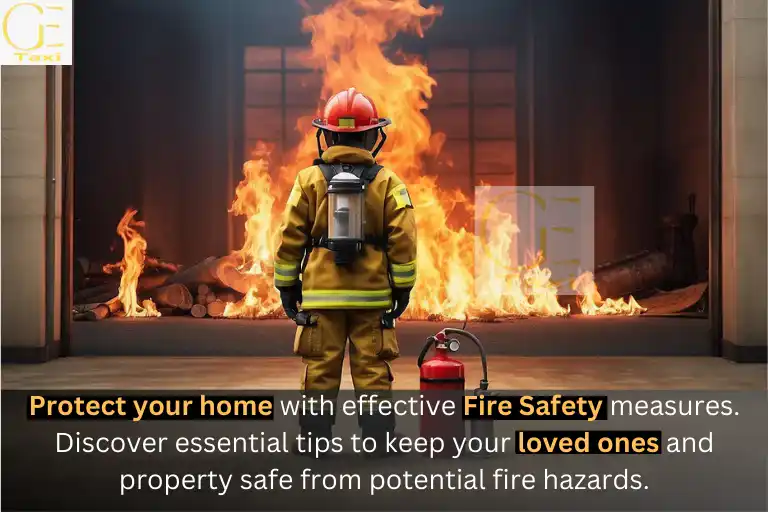Fire is a powerful force that may be both a source of warmth and a potential peril. Understanding the fundamentals of fire safety is more than simply a precaution; it is a necessary life skill. This blog will guide you through the fascinating world of fire safety, arming you with the knowledge and methods you need to protect yourself, your loved ones, and your property from the threat of fire.
The Fire Triangle: Fuel, Oxygen, Heat
Before we dive into fire safety measures, let’s explore the fundamentals. Fire, at its core, is a chemical reaction that requires three key elements: fuel, oxygen, and heat. These elements are often represented as the “fire triangle.” Remove one of these elements, and the fire will cease. Understanding this concept is the foundation of fire safety.
- Fuel: Fuel is the substance that burns. It can be anything from wood and paper to flammable liquids and gases. Storing flammable materials safely and using them with caution is the first step in fire prevention.
- Oxygen: Fire requires oxygen to burn. Adequate ventilation and oxygen supply are crucial factors in the intensity of a fire. Keep areas well-ventilated and avoid smothering flames by covering them.
- Heat: Heat is the ignition source. It can come from a variety of sources, including open flames, electrical faults, or even spontaneous combustion. Be cautious around potential heat sources, and store flammable materials away from them.
Preventing fires in your home is a crucial step in keeping your family and property safe. Let’s break down the key measures in simple and accessible language:
Preventing Fires in the Home
1. Smoke Alarms:
- What to Do: Install smoke alarms in your home. These devices detect smoke and sound an alarm if a fire starts.
- Why It’s Important: Smoke alarms give you an early warning, so you can escape a fire quickly. Test them regularly to make sure they work.
2. Fire Extinguishers:
- What to Do: Keep a fire extinguisher in the kitchen and near other fire-prone areas, like the garage. Learn how to use it.
- Why It’s Important: A fire extinguisher can help you put out small fires before they get bigger. Knowing how to use it safely is key.
3. Electrical Safety:
- What to Do: Check your electrical outlets and wires for any damage. Don’t overload outlets, and unplug appliances when you’re not using them.
- Why It’s Important: Faulty electrical systems can cause fires. Being careful with electricity reduces this risk.
4. Kitchen Safety:
- What to Do: Pay close attention when cooking. Don’t leave the stove unattended, and keep flammable things away from it.
- Why It’s Important: Most home fires start in the kitchen. Being cautious while cooking is a big step in preventing fires.
5. Candles and Smoking:
- What to Do: Never leave lit candles unattended, and put them out before you go to bed. If you smoke, do it responsibly and avoid smoking in bed.
- Why It’s Important: Unattended candles and careless smoking are common causes of fires in homes.
Preventing fires in your home is about being vigilant and taking simple, everyday precautions. These steps can significantly reduce the risk of a fire starting in your home, ensuring the safety of your loved ones and your property.
Escape Plans and Fire Drills
Prepare your family for fire emergencies:
- Escape Routes: Have a clear escape plan for your home. Ensure that everyone knows how to exit safely in the event of a fire.
- Fire Drills: Regularly practice fire drills with your family. Simulate various scenarios to ensure everyone is familiar with the escape plan.
Outdoor Fire Safety
- Campfires: If you enjoy campfires, build them in designated areas and never leave them unattended. Ensure the fire is fully extinguished before leaving.
- Barbecue Safety: Follow safety guidelines for barbecues. Keep them away from structures and flammable materials, and never use them indoors.
Fire Safety in the Workplace
- Fire Alarms and Extinguishers: Ensure that your workplace has functioning fire alarms and extinguishers. Know their locations and how to use them.
- Emergency Procedures: Familiarize yourself with workplace emergency procedures, including evacuation routes and assembly points.
- Electrical Safety: Report any electrical faults or hazards immediately. Do not overload power outlets, and follow electrical safety guidelines.
Fire safety is a responsibility we all share. By understanding the fire triangle, practicing prevention, and having a well-thought-out escape plan, you can significantly reduce the risk of fire-related accidents and ensure the safety of your loved ones and property. Remember, in the face of fire, knowledge truly is power.
Read Also:-
- GE Taxi
- Dot2Dot
- Golden Executive
- GE Coaches
Our Social Media Platforms
